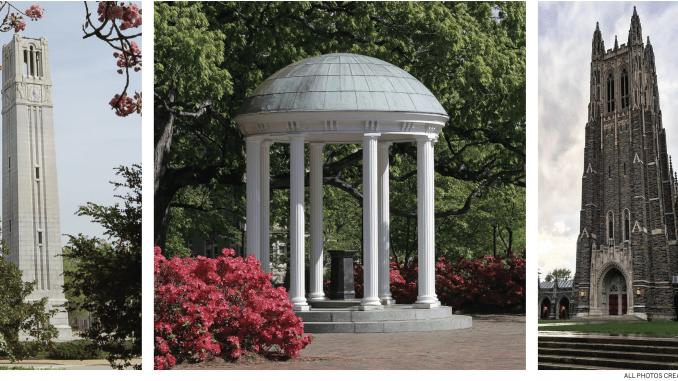
 The following is the first of four installments that mark the low points in the Big Four universities tacking left
The following is the first of four installments that mark the low points in the Big Four universities tacking left
Car crashes often involve drivers who run off the right side of the road, overcorrect, cross the center line, and slam into a tree on the left side of the highway. I use that scene as an analogue for the direction American universities are headed, but my focus here is upon the course North Carolina’s Big Four universities plotted in the 1980s.
If you follow trends in higher education, you know that academe’s leftward lurch originated in university English departments, that promoting “social justice” has become the ruling ethos in all the humanities and that dissenting faculty have been silenced — and in some cases “cancelled” by leftist professors, by student proselytes or by skittish administrators.
What you might not know is that the leftists’ takeover of North Carolina universities had as much to do with promoting themselves as it did with promoting social justice. Take a crop of upstart PhDs who land jobs in Research I institutions. Add the rule “publish or perish” — actually, make that, “publish something cutting edge or perish.”
Now imagine a crop of upstarts competing to invent a new angle on Hamlet or Huck — then spotting the opening. If, prior to 1980, scholars had revered Western writers as a source of insight and inspiration, the Young Turks would recast them as the enemy in their war on “injustice” and “inequality” — and cast themselves as liberators of “marginalized voices.”
NC State’s English department was the first of the Big Four to make headlines when its Young Turks opened fire on senior faculty for maintaining strict standards for student writing and for teaching great works. Lucky for me, the guardians of strict standards were still in charge when I was a grad student at State, and their commitment to teaching, to scholarship and to student success I still say is unmatched.
Enter department head John Bassett, who, in August, 1984, announced plans to take the department “in a radically different” direction that would transform English 101, “demystify” literature and showcase faculty who impose “gender-deconstructionist,” “Marxo-constructivist,” or “post-structuralist” interpretations on classical literature.
Under Bassett’s direction, the department would no longer concern itself with “what a work means” because how poems and novels “signify in various contexts” was all the rage — in this case — literally.
What ensued was a battle so fierce it attracted the attention of Pulitzer Prize-winning journalist Michael Skube. For a 1988 News and Observer feature, Skube examined the conflict and found himself caught in the crossfire between faculty who saw writing as an arduous process done mostly in isolation and a new crop of “experts” who had revamped composition as a group activity for budding activists.
Just as heated was the clash between scholars who observed that students “become good writers by reading great writing” and State’s new director of composition who claimed, “Research shows that we learn to use discourse by reading voluntarily when we are young, but not much as we grow older.” Backed by a department head who was besotted with “cutting edge research” and who aimed to reinvent English studies as a “social science,” the Young Turks won the battle Skube had likened to “an academic Beirut.”
In 1993, having earned his badge as a “reformer,” Bassett left State to upgrade his status at Case Western Reserve, but not before the new guard was firmly entrenched, and the old guard was consigned to a frustrated silence. Bassett’s best-known legacy concerns the willful erosion of a classical education, but he also empowered scholars who encourage students to wage war against “cultural authority.” It was Bassett who urged faculty to “make up for our students’ deficiencies in world culture and pluralism,” but it is university administrators who wield absolute power when they follow that trend.
Like the other three leaders of North Carolina’s Big Four, State’s Chancellor Randy Woodson issued a June statement condemning “white supremacy” and “racial injustice” and requiring “every student, faculty and staff member to complete diversity and inclusion learning modules” during the academic year. The notion that every student, faculty, and staff needed some form of rehab did not sit well with certain students who’ve posted their misgivings online. Comments vary, but the one I wish I’d thought of comes from the student who asks, “When will it end?” and includes a picture of preschool’s favorite rabbit, with the caption “Goodnight moon, Goodnight Zoom, Goodnight sense of impending doom!”
When the great lexicographer Samuel Johnson said that “Nothing odd will do long,” he never dreamed that social justice warriors would one day take over our universities, then rule the humanities for the next 40 years. They can spot the abuse of power everywhere — except in their own little fief.




